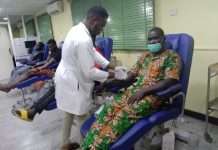
At the Nigerian Healthcare Awards 2021, held in Lagos, the state’s Commissioner for Health mentioned that the state had lost 14 healthcare professionals to COVID-19. Healthcare professionals have always been positioned to provide basic health services to the general populace. The rigorous training that doctors, pharmacists, nurses and other members of the clinical team undergo in school prepares them to serve humanity by managing and treating diseases and ailments. This could range from minor to major ailments and the degree of specialty required for the varying cases may differ and further necessitate even more training. Despite this range, the core responsibility of the HCP (healthcare provider) does not change across the disease spectrum. The HCP is responsible for restoring health and vitality through proper diagnosis and treatment of ailments.
Regardless of their levels in the healthcare chain, these professionals are still humans who could fall prey to the same diseases they manage and treat. While they might sometimes be considered immortal, they have frailties just like every other human. This reality of their limitations births the question, “What is the worth of your life?”
This question calls for introspective analysis, as well as an observation of the practice environment, to understand and appreciate the need for care – both selfcare and the care provided by the healthcare system to which we belong.
Of an estimated 5.9 million healthcare workers in the world, research has shown that the disease burden caused by sharp injuries is about three million per year. About 40 per cent of hepatitis B and C infections and 4.4 per cent of HIV among healthcare workers were due to needle stick injuries. About 1,000 healthcare workers die annually, due to occupational HIV. These figures show that the healthcare professional truly risks his or her life while trying to save that of others.
Caring for the caregiver
Reports from various sources are staggering, yet there doesn’t seem to be any structure in place to reduce these numbers. With the knowledge of this, who will bell the cat? Will this responsibility fall on the patients, the government and the institutions these workers report to or will the caregiver have to bear the responsibility alone?
In Nigeria, several challenges have been reported within the health sector, especially in training, funding, employment and deployment of the health workforce. With these challenges deeply seated in the sector, the government seems to take a backseat in addressing the care of healthcare workers. The responsibility of self-care is majorly on the professionals’ shoulders.
Although subjected to rigorous and sometimes inhumane treatment, medical staff work hours on end without breaks, due to consistent short-staffing in the healthcare facilities. Even when sick, some healthcare professionals are compelled to resume shifts in spite of their ill-health. The government, which a lot of them work for, also does not handle the state of health of these professionals as a priority and this negligence on the part of the government can sometimes lead to far-reaching effects on the healthcare system. A recent example is the strike action by the National Association of Resident Doctors in Nigeria, due to perceived lack of concern for their plight. The resident doctors had to embark on an indefinite strike to prove their point; yet, so far, no significance change has been made.
If the government will not take this responsibility and even still pays a paltry sum of N5000 as “hazard allowance”, then who cares about the health and life of the HCP? The demand to compensate families of those who lost their lives in service against COVID-19 has not been met and the current health ministry refuses to budge. If the Ministry of health will not respond to agitations by members of the health sector, then who cares? The story is not much different for HCPs working for private institutions. Who will look out for these supermen and women as they work?
The pharmacist’s burden
Taking a leaf from this, it is good to note that a lot of the demands being agitated for (by the resident doctors) are not exclusive to the doctors. Pharmacists are not left out of this ill-treatment. Therefore, we need to stand together now more than ever. As a professional body, we need to care for each other – the older employees for the younger ones and vice versa. We also need to look out for our health individually.
Dear (young) pharmacist, do you maintain a healthy lifestyle, as you encourage your patients to? Do you cut down on junks and take supplements to boost your immunity? Do you exercise and drink water regularly? Do you get adequate rest? Are you vaccinated against communicable diseases, such as hepatitis B? Have you taken the COVID-19 vaccine? These questions and more should be asked so that we are not just caring for others but also for ourselves.
We are well aware that our current society may not be the most enabling of environments. However, we must rise up to the responsibility to care for ourselves, so that we who treat others may also enjoy good health and longevity. No one can place a value on your life. Neither the government nor the patient can. Only you can state what you are worth as a professional. So, take care of yourself – you deserve it!
What are your expectations as a (young) pharmacist navigating the Nigerian healthcare system? Optimistic or downright hopeless about our current state? Please share with us. We would like to hear from you.
Pharm Morenikeji Haruna
PSN-Young Pharmacists Group, Lagos













